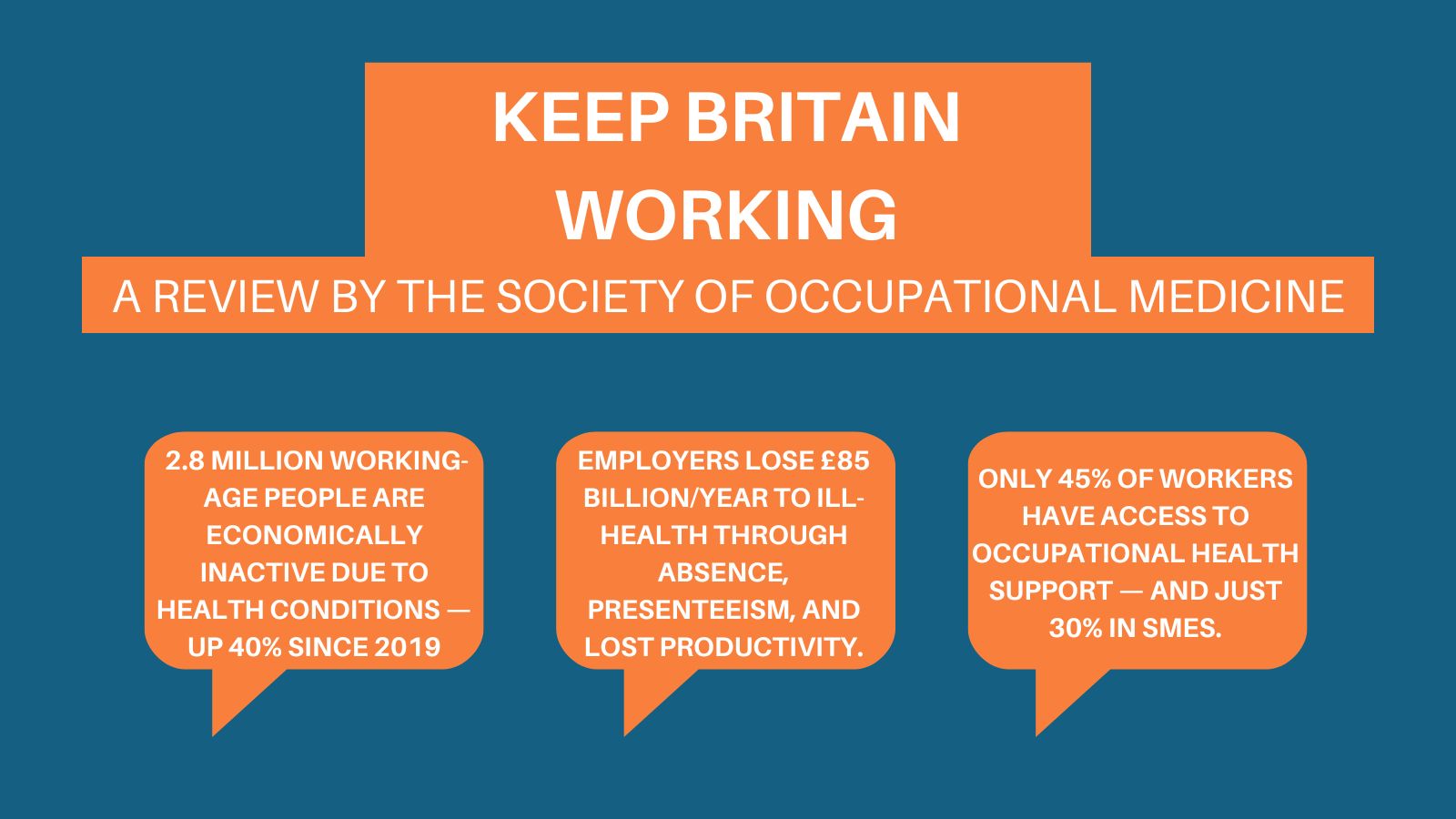A new review by the Society of Occupational Medicine (SOM), Keep Britain Working, highlights a worrying trend: over one in five working-age adults in the UK are now economically inactive, and rising ill health is a major factor.
👉 Read the full report here (PDF)
The report estimates that the cost to society of health-related worklessness is around £212 billion per year, equivalent to 7% of GDP.
For employers, the impact is direct: higher absenteeism, lost productivity, and long-term challenges retaining experienced staff.
At Acorn Occupational Health, we believe that early management referrals are one of the most effective tools employers can use to tackle these challenges – supporting employees, reducing costs, and strengthening workforce resilience.
What the Report Reveals
The Keep Britain Working review outlines several key findings:
- Sickness absence costs employers an average of £120 per day in lost profit.
- The longer someone is off work, the less likely they are to return – after one year, fewer than half do.
- Fear and confusion prevent both employees and managers from addressing health issues early.
- Many SMEs lack access to occupational health, creating an inconsistent support landscape across the UK.
These findings underline what we see every day in practice: without early and structured intervention, health issues too often escalate into long-term absence or permanent loss from the workforce.
The Role of Management Referrals
A management referral is the process by which a line manager or HR professional refers an employee to an occupational health for professional advice and support.
At Acorn, we see management referrals as an essential part of any proactive wellbeing strategy, offering a structured route to support rather than leaving managers unsure how to help.
Our approach focuses on early action, collaboration, and practical solutions that keep people at work where possible, or help them return safely and sustainably.
How Early Referrals Align with National Priorities
The Keep Britain Working report identifies three main problem areas, and management referrals directly address each one:
- Breaking the Culture of Fear
“Employees told us they fear disclosing health conditions… Employers and line managers admitted fearing doing the wrong thing.”
– Keep Britain Working, 2025
A clear referral pathway helps to normalise early conversations about health.
By offering employees structured, professional support, managers can act confidently and compassionately, before small issues become major problems.
- Bridging the Support Gap
Only around 30% of SMEs currently have access to occupational health services.
Acorn’s system fills that gap, offering employers practical access to:
- Management Referral Assessments – with a comprehensive report and actionable recommendations.
- Employee Listening Service – confidential conversations with an occupational health professional, offering support and next steps.
- Return-to-Work Planning – structured, evidence-based support for employees coming back after sickness absence.
By catching issues early, employers can prevent long-term absence and reduce staff turnover.
- Overcoming Barriers to Return
The report notes that the likelihood of a successful return to work drops sharply after a year of absence.
Our Ergonomic Assessments identify what an employee can do safely, enabling a phased or adjusted return, rather than permanent withdrawal from work.
Early referral supports inclusion, retention, and employee confidence.
Practical Steps for Employers
The SOM review makes one thing clear: employers play a critical role in tackling health-related inactivity. Here’s how to take action:
Embed early referral routes – Make sure managers know when and how to refer.
Clarify internal processes – Define roles for HR, line managers, and occupational health providers.
Train managers – Build confidence around sensitive conversations and reasonable adjustments.
Track outcomes – Use data to monitor absence, referrals, and return-to-work success.
Build leadership buy-in – Treat health and inclusion as strategic, not administrative.
The Keep Britain Working report leaves no doubt: early intervention is not a luxury, it’s a necessity.
Management referrals turn good intentions into tangible action, helping employees stay healthy, productive, and engaged at work.
If you’d like to learn more about implementing a management referral process or review your current approach, get in touch with the Acorn team today.
📞 01260 27797
📧 website@acornoh.co.uk

